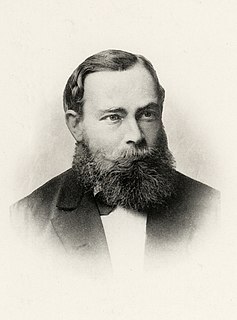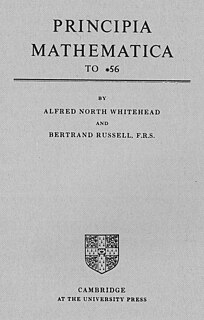See also
- Principia Mathematica (1910–13), by Russell and Whitehead
Mathematical philosophy may refer to:

Bertrand Arthur William Russell, 3rd Earl Russell was a British philosopher, logician, and public intellectual. He had a considerable influence on mathematics, logic, set theory, linguistics, artificial intelligence, cognitive science, computer science and various areas of analytic philosophy, especially philosophy of mathematics, philosophy of language, epistemology, and metaphysics.

Ludwig Josef Johann Wittgenstein was an Austrian-British philosopher who worked primarily in logic, the philosophy of mathematics, the philosophy of mind, and the philosophy of language. He is considered by some to be the greatest philosopher of the 20th century.

Alfred North Whitehead was an English mathematician and philosopher. He is best known as the defining figure of the philosophical school known as process philosophy, which today has found application to a wide variety of disciplines, including ecology, theology, education, physics, biology, economics, and psychology, among other areas.

In mathematical logic, Russell's paradox is a set-theoretic paradox discovered by the British philosopher and mathematician Bertrand Russell in 1901. Russell's paradox shows that every set theory that contains an unrestricted comprehension principle leads to contradictions. The paradox had already been discovered independently in 1899 by the German mathematician Ernst Zermelo. However, Zermelo did not publish the idea, which remained known only to David Hilbert, Edmund Husserl, and other academics at the University of Göttingen. At the end of the 1890s, Georg Cantor – considered the founder of modern set theory – had already realized that his theory would lead to a contradiction, which he told Hilbert and Richard Dedekind by letter.
The philosophy of mathematics is the branch of philosophy that studies the assumptions, foundations, and implications of mathematics. It aims to understand the nature and methods of mathematics, and find out the place of mathematics in people's lives. The logical and structural nature of mathematics itself makes this study both broad and unique among its philosophical counterparts.

Friedrich Ludwig Gottlob Frege was a German philosopher, logician, and mathematician. He worked as a mathematics professor at the University of Jena, and is understood by many to be the father of analytic philosophy, concentrating on the philosophy of language, logic, and mathematics. Though he was largely ignored during his lifetime, Giuseppe Peano (1858–1932), Bertrand Russell (1872–1970), and, to some extent, Ludwig Wittgenstein (1889–1951) introduced his work to later generations of philosophers. Frege is widely considered to be the greatest logician since Aristotle, and one of the most profound philosophers of mathematics ever.
In logic and linguistics, a proposition is the meaning of a declarative sentence. In philosophy, "meaning" is understood to be a non-linguistic entity which is shared by all sentences with the same meaning. Equivalently, a proposition is the non-linguistic bearer of truth or falsity which makes any sentence that expresses it either true or false.

Analytic philosophy is a branch and tradition of philosophy using analysis, popular in the Western world and particularly the Anglosphere, which began around the turn of the 20th century in the contemporary era in the United Kingdom, United States, Canada, Australia, New Zealand, and Scandinavia, and continues today. There is, however, no clear distinction between continental and analytical philosophy.

Metamathematics is the study of mathematics itself using mathematical methods. This study produces metatheories, which are mathematical theories about other mathematical theories. Emphasis on metamathematics owes itself to David Hilbert's attempt to secure the foundations of mathematics in the early part of the 20th century. Metamathematics provides "a rigorous mathematical technique for investigating a great variety of foundation problems for mathematics and logic". An important feature of metamathematics is its emphasis on differentiating between reasoning from inside a system and from outside a system. An informal illustration of this is categorizing the proposition "2+2=4" as belonging to mathematics while categorizing the proposition "'2+2=4' is valid" as belonging to metamathematics.
In the philosophy of mathematics, logicism is a programme comprising one or more of the theses that — for some coherent meaning of 'logic' — mathematics is an extension of logic, some or all of mathematics is reducible to logic, or some or all of mathematics may be modelled in logic. Bertrand Russell and Alfred North Whitehead championed this programme, initiated by Gottlob Frege and subsequently developed by Richard Dedekind and Giuseppe Peano.

Logical atomism is a philosophical view that originated in the early 20th century with the development of analytic philosophy. Its principal exponent was the British philosopher Bertrand Russell. It is also widely held that the early works of his Austrian-born pupil and colleague, Ludwig Wittgenstein, defend a version of logical atomism. Some philosophers in the Vienna Circle were also influenced by logical atomism. Gustav Bergmann also developed a form of logical atomism that focused on an ideal phenomenalistic language, particularly in his discussions of J.O. Urmson's work on analysis.

Ivor Owen Grattan-Guinness was a historian of mathematics and logic.
Introduction to Mathematical Philosophy is a book by philosopher Bertrand Russell, in which the author seeks to create an accessible introduction to various topics within the foundations of mathematics. According to the preface, the book is intended for those with only limited knowledge of mathematics and no prior experience with the mathematical logic it deals with. Accordingly, it is often used in introductory philosophy of mathematics courses at institutions of higher education.
In the philosophy of mathematics, formalism is the view that holds that statements of mathematics and logic can be considered to be statements about the consequences of the manipulation of strings using established manipulation rules. A central idea of formalism "is that mathematics is not a body of propositions representing an abstract sector of reality, but is much more akin to a game, bringing with it no more commitment to an ontology of objects or properties than ludo or chess." According to formalism, the truths expressed in logic and mathematics are not about numbers, sets, or triangles or any other coextensive subject matter — in fact, they aren't "about" anything at all. Rather, mathematical statements are syntactic forms whose shapes and locations have no meaning unless they are given an interpretation. In contrast to logicism or intuitionism, formalism's contours are less defined due to broad approaches that can be categorized as formalist.

The Principles of Mathematics (PoM) is a 1903 book by Bertrand Russell, in which the author presented his famous paradox and argued his thesis that mathematics and logic are identical.

The aspects of Bertrand Russell's views on philosophy cover the changing viewpoints of philosopher and mathematician Bertrand Russell (1872–1970), from his early writings in 1896 until his death in February 1970.
Mathematics has no generally accepted definition. Different schools of thought, particularly in philosophy, have put forth radically different definitions. All proposed definitions are controversial in their own ways.

Steven M. Awodey is an American mathematician and logician. He is a Professor of Philosophy and Mathematics at Carnegie Mellon University.

Remarks on the Foundations of Mathematics is a book of Ludwig Wittgenstein's notes on the philosophy of mathematics. It has been translated from German to English by G.E.M. Anscombe, edited by G.H. von Wright and Rush Rhees, and published first in 1956. The text has been produced from passages in various sources by selection and editing. The notes have been written during the years 1937–1944 and a few passages are incorporated in the Philosophical Investigations which were composed later. When the book appeared it received many negative reviews mostly from working logicians and mathematicians, among them Michael Dummett, Paul Bernays, and Georg Kreisel. Today Remarks on the Foundations of Mathematics is read mostly by philosophers sympathetic to Wittgenstein and they tend to adopt a more positive stance.

Logic is the study of correct reasoning or good arguments. It is often defined in a more narrow sense as the science of deductively valid inferences or of logical truths. In this sense, it is equivalent to formal logic and constitutes a formal science investigating how conclusions follow from premises in a topic-neutral way or which propositions are true only in virtue of the logical vocabulary they contain. When used as a countable noun, the term "a logic" refers to a logical formal system. Formal logic contrasts with informal logic, which is also part of logic when understood in the widest sense. There is no general agreement on how the two are to be distinguished. One prominent approach associates their difference with the study of arguments expressed in formal or informal languages. Another characterizes informal logic as the study of ampliative inferences, in contrast to the deductive inferences studied by formal logic. But it is also common to link their difference to the distinction between formal and informal fallacies.